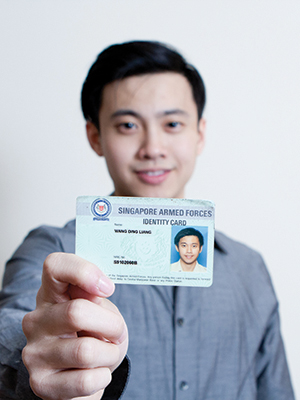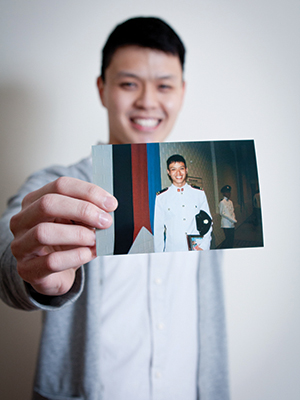
Ding Wang couldn’t move.
After hours of intense training—trekking miles on an island just off of Singapore carrying a pack loaded with a tent, survival gear, water, ammunition and a SAR 21 rifle—he wasn’t just tired. He was having a seizure. And he thought he was going to die.
“[I had] a lot of thoughts, like, ‘Have I actually told my parents that I loved them in how many years?’" says the Weinberg sophomore. "They always go, ‘Ding, we love you!’ and I’m always like ‘Yeah, sure, cool.’”
The seizure, which Wang believes was caused by sweating out all of his body’s salts, happened during basic training for the Singaporean military service.

Joining the Singaporean army is mandatory for all male citizens when they reach the age of 18. In order for the small nation to have a significant standing army, all men are required to serve about two years, depending on which branch they enter.
Of about 72,000 members of the military, almost 40,000 of them—57 percent—are conscripted. They go through three months of basic training, then are streamed into the different branches of the military.
When Singapore became independent in 1965, one of its first orders of business was to set up a military. Officials decided to use Israel as a model and had advisers secretly travel to Singapore to help with training. No one could know, because Singapore did not want to cause a conflict with its neighboring Islamic countries. Unlike Israel, only men are conscripted into military service.
Part of their training includes the grueling march Wang experienced, which is followed by setting up camp and digging trenches. “They start punishing you guys for being too slow,” Wang says. “There’s actually no way to go faster than what you’re doing, but they’ll punish you in any case.”
The punishments included more drills and one of them sent Wang into seizure. He was taken away to get rehydrated and regain full strength. Weinberg sophomore Chen Ming Cheong also went through the Singaporean military, but on the path to becoming an officer. After the three months of basic training, he went to Officer Cadet School (OCS), where he trained for another nine months and was promoted to First Lieutenant. During both basic and OCS training, Cheong pushed his limits physically and mentally, especially during a particularly grueling exercise known as the Centipede Drill, which took place in the sweltering southeast Asian tropical rainforests.
“We had to simulate being a platoon that had to defend a hill,” Cheong says. “Two people had to dig a fire trench … Basically it was just a nonstop digging process. After we dug the trench, I never thought I could do it because it was just nonstop. I didn’t sleep for like 34 hours in a row.”
His superiors then sent another platoon to “assault” the hill. Cheong and his fellow soldiers, exhausted from being overworked, had to remember everything they had been taught to defend the hill. Halfway through the exercise, however, something didn’t go according to the script. “It’s monsoon season, it’s a monsoon climate, so there’s a lot of lightning, so our area was struck by lightning,” he says. “There was a tall tree and it struck the tree and it hit my friends around the trees.”
The friends were immediately evacuated to the hospital, but the rest of the platoon continued with the drill without their comrades. “You have four or five friends in the hospital, wondering what happened to them, how they are feeling,” Cheong says. While Singapore was never at war during their tenure, other nations, like South Korea, have 18-year-old conscripts whose futures are less certain.
“I mean sure, [Singapore] might have a tenuous peace agreement,” Wang says. “But if you’re in the Korean army, you can be called up at any time to face North Korea.”
After finishing his training, Wang worked at the Sembawang Air Base, where his two main jobs were airspace planning and coordination and response.
“The airspace zone that we actually have to cover spans from Singapore to Manila” he says. “It’s quite a huge area. Basically what I have to do is get them down and then get them clearance to take off. Then, they go, and I have to keep constant tabs on them, and then always update and [give] feedback to the squadron at the same time. So I’m like the middleman through which all that information has to pass.” On his first day, things didn’t go as planned. An Apache helicopter had a dual-engine failure. According to Wang, the emergency was unprecedented.
“Everyone else who [had] handled an emergency was like, ‘Another aircraft has suffered a lightning strike, maybe we need to standby, send people there,’” Wang says. “It's never something like, ‘Something is going down.’ Literally going down. This doesn’t happen.” The pilots were able to minimize the harm by rotating the helicopter in order to keep the rotor spinning by using its momentum. When it crashed, only the tail broke off and the two pilots walked away unscathed.
When both Wang and Cheong finished their two-year tenures, they decided to come to Northwestern, bringing with them all of the life lessons they learned in the military.
“It’s very much this process of teaching you discipline, teaching you time management, just doing the right things even when no one is looking,” Cheong says.
Wang agrees, believing that one of the most important values he learned during his service was putting himself in other people’s shoes.
“You start to empathize, you start to see things through other people’s eyes,” he says. “All that matters is that you’re brothers. Brothers in arms.”